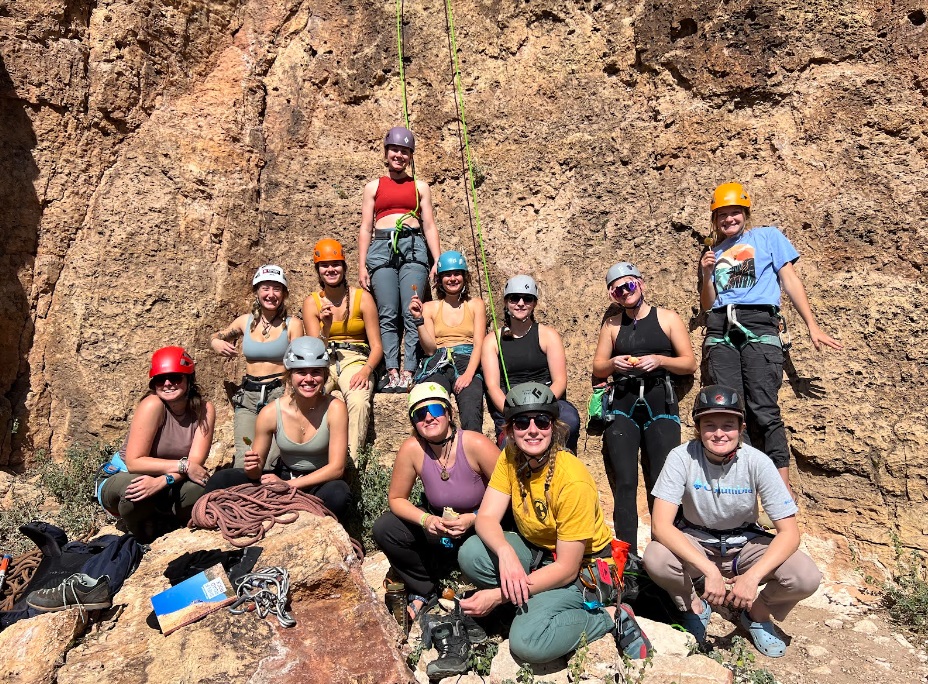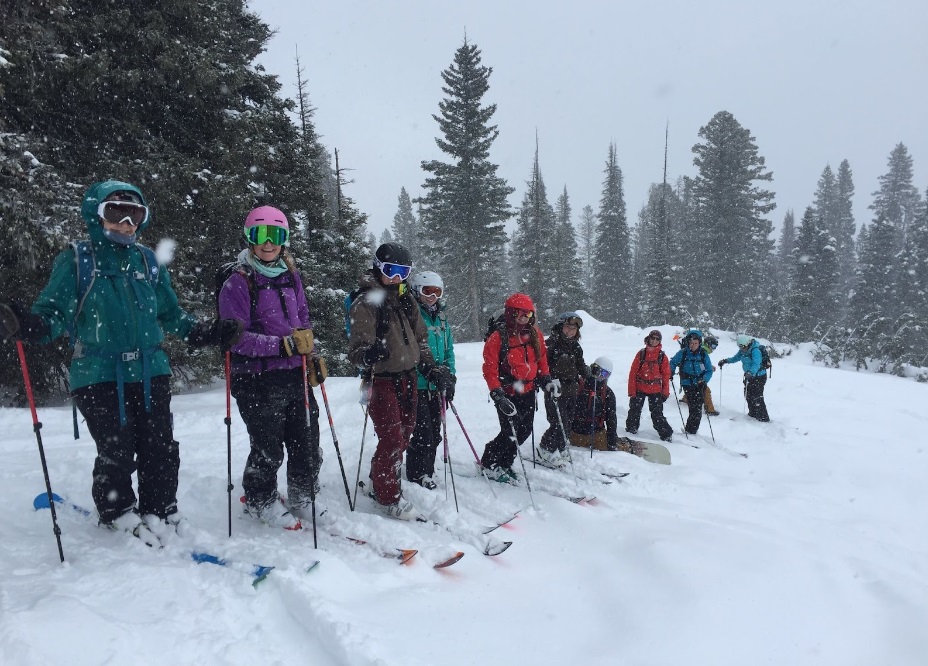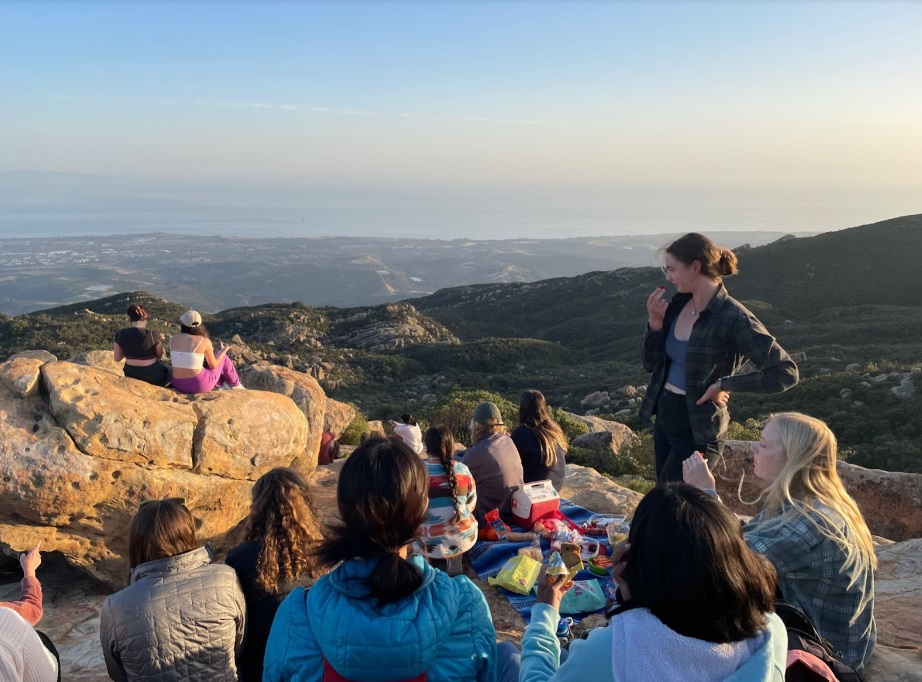Darby Knoll is the Executive Director of Backcountry Squatters, a nonprofit dedicated to creating a safe, thriving space for women and non-binary folk in outdoor communities and industries. Backcountry Squatters focuses on developing the participation, representation, and leadership potentials of college-aged women and non-binary folk in the outdoors, often introducing them to outdoor sports for the first time. Growing up in the Western United States, Darby cultivated a deep passion for the environment. Her involvement with the ’Squatters has helped her grow into a strong advocate and leader for the underrepresented demographics she serves. Join us for this month’s exciting edition of 18 Questions as we learn more!
- How did you first get involved with Backcountry Squatters?
I first got involved with Squatters when it was starting as a Montana State University Club in the fall of 2015. I received a text from my best friend asking if I wanted to go check out the first meeting of the new women’s outdoor adventure club. Thinking it would be something smaller and more intimate than some of the other university meetings, I said of course! I remember showing up to see about 60 gals, all looking for the same thing: adventure partners with the same lived experiences. I don’t think anyone expected that turnout. After one of the first meetings, I went to talk to a co-founder, Andie Creel, about my lack of educated female partners in the backcountry skiing world and my desire to change that. By the end of the conversation, I had been convinced to join the executive board of the MSU Club, and I have been involved ever since.
- How have you seen the organization grow and change since then?
While we were still a club at MSU, we had people from all over reach out to us about starting their own Squatters Chapters at their respective universities. When the original executive members of the MSU club were graduating, we felt like there was a need to provide an overall organizational structure to this growing community and raise funds for financial aid. So with the support of Kelly Balfanz, Andie Creel, and Kit Kocha, we formed a 501c3 organization with me as the first Executive Director. Today, we have Backcountry Squatters chapters at 12 universities nationwide, have provided 14 Scholarships for outdoor education, and require DEI (Diversity, Equity, and Inclusion) training for all Backcountry Squatters leaders.
- What does it take to start a Backcountry Squatters chapter?
If a person is interested in starting a chapter at their university, all they have to do is reach out to us! Our email is info@backcountrysquatters.org. From there, we will set up a meeting with our Director of Outreach and their regional ambassador to see if Backcountry Squatters is a good fit for their university. Then we will walk the interested person through all the necessary processes for setting up a club at their university and joining our nationwide community network.

- What are a few ways in which each chapter differs (cultural atmosphere, activities, etc.)?
Each chapter adapts its structure and events to the existing campus culture. Some chapters conduct more beginner outdoor events, while others offer more expert events—all depending on their members’ wants and needs. Chapter events are also unique to each chapter’s geographic location. For example, our chapter at the University of California, Santa Barbara, has done a few surf sessions, which are unavailable in our Salt Lake City chapters.
- Do chapters interact with one another?
We have a Squatter app that all members can join. Each chapter has a group within the app for chapter members to communicate with themselves, but the app also allows for chapters to communicate with each other. We also hold one big meeting per semester with all the chapter executives so they can share what has been working with their clubs and what they are trying to do differently. In the end, the chapter-to-chapter interaction is totally left up to the chapters themselves, with some chapters being a lot more outgoing than others, depending on their needs and intents.
- How did individual chapters and Backcountry Squatters as a whole adapt to the limitations of the pandemic?
The pandemic was really hard on Backcountry Squatters, as you can imagine, for an organization that is focused on in-person community events. We went into the pandemic with nine active chapters and came out of it with three. Many of our chapters had strict limitations from their universities on what clubs were allowed to do and not allowed to do, and some of them just had to forfeit their “active” status.
The idea of the Squatter’s app was born during the pandemic; we wanted a space where our members could communicate on a digital platform that wasn’t Facebook or Slack, but something more personal to Backcountry Squatters.
- What are some key ways you incorporate underrepresented demographics?
Backcountry Squatters is a nationwide network dedicated to growing women and non-binary peoples’ representation and leadership within the outdoor industry and community. We aim to create a safe space where women and non-binary folks can explore their connection to the natural world in a judgment-free zone. By way of our mission, we naturally appeal to underrepresented demographics. We recognize that these outdoor spaces are predominantly white, as are most of our clubs. We require our club executives to take DEI training and encourage everyone to always think about how their Backcountry Squatters chapters can feel as inclusive as possible.
- What anti-racism educational opportunities do you offer members?
In October of 2022, we were incredibly fortunate to hire Dr. Thomas RaShad Easley to conduct Diversity, Equity, and Inclusion Training for all our ambassadors, Board of Directors, staff members, and chapter executives at each active university. Dr. Easley is a certified diversity, equity and inclusion consultant that works with academic institutions, corporate entities, and other organizations to help them actualize a strong diversity initiative that welcomes everyone and shifts work culture to be equitable. He served as the inaugural diversity director at NC State University College of Natural Resources. He also served as the inaugural Assistant Dean of Community and Inclusion at the Yale School of the Environment. Easley recently published the text Mind Heart for Diversity and established his diversity consultancy under the same name.
We also provide the funding for all staff, board, and ambassadors to complete at least eight extra hours of anti-racism training.

- What does a “safe space” mean to you in relation to Backcountry Squatters programming?
To me, a safe space is a place where any person can show up as an authentic self and feel like they will be supported in whatever activity they’re taking on. For example, a Squatter can show up to a climbing night without experience or knowledge of the activity. I hope we will create a community where that person can feel supported to learn without judgment or outside pressures.
- Why is it important for women to be part of a community with other women?
Since the inception of Backcountry Squatters as an MSU club, I think we have all learned that something powerful happens when a bunch of women get together outdoors. Set free in the sanctity of an all-female space and the outdoors, women begin to collaborate, brainstorm, and lead, often for the greater good. Women broadly share experiences that most men don’t and thus can work together to build each other up from a place of mutual understanding and meaningful encouragement.
- Touch on the annual Backcountry Squatters calendar—how and why did this tradition begin?
In 2017, when I was still in college and a member of MSU Backcountry Squatters, another member (Jenny Irwin) approached the executive team with the idea of doing a nude fundraising calendar, as the US ski team did. I absolutely loved the idea and had the time to help pull this off, so I was the executive member that began leading this initiative. The goal of the calendar was always to create a calendar of women doing their normal day-to-day outdoorsy activities completely nude, with the hope of desexualizing the female body and embracing the human form.
The first year we tried to pull it off, we got shut down by MSU and were told that we could not produce the calendar as an MSU club. So over the next year, we spent some time crafting the messaging around the calendar and what we were really hoping to accomplish, and we also got some other MSU clubs’ endorsements. We went back to MSU for approval and received it, and we have been making the calendar ever since. It has since transitioned into a project where members from all over the country can submit their photos for consideration, which has been a really cool collaboration to see!
- Share an experience that has demonstrated to you how outdoor adventure can encourage leadership skills.
When I came to MSU, I had a solid four years of backcountry skiing experience and education under my belt. As a freshman, I was eager to explore the touring possibilities of the greater Yellowstone ecosystem. During freshman year, I was lucky enough to find a handful of touring partners with whom I felt safe in the backcountry (which can be rare for college kids!). In early 2015, approximately 80% of the people I saw backcountry skiing were men. The following year, when Backcountry Squatters was getting started at MSU, and I was just getting my toes wet in outdoor leadership, I decided to lead a Backcountry Ski Day for Squatters.
Looking back on it, this was my first time leading a touring adventure. In the past, my male partners (one of them being my older brother) always took the lead—and I always let them. I was nervous about showing up at the parking lot where we had agreed to meet. I felt wildly underqualified and second-guessed why I thought I could lead this adventure. But when I arrived at the parking lot, there were four college gals, all looking to me for directions. All four Squatters had never been backcountry skiing before and were all on rented equipment. In the parking lot, we went through putting on your skis, packing your backpack, and some basic snow safety procedures. When we got a little bit away from the trailhead, we practiced using our beacons, and while touring, we talked about snowpack, slope angles, and how to pull off a tricky kick turn.
We also talked about why they were there. The women represented a full range of ages, backgrounds, and experiences, but they all had the same basic desire to be there: they had always wanted to try backcountry skiing, but had never felt the confidence to ask their male friends to take them out. I was happy that I could be the person to lead them.
Backcountry Squatters gave me a safe, small group to figure out my unique leadership and collaboration style. At Squatters, we focus on how women uniquely support one another, the barriers for women in coming together and advancing in leadership, and the gains society sees when women lead. We treat ALL leadership as important—leading a 5.9 climb, leading the food planning for an outing, leading emergency first aid…it all counts.
- Describe the Backcountry Squatters scholarships and who they are meant to serve.
The current scholarship program is geared towards women and non-binary folks looking to expand their outdoor education to either better their communities or help them along their way to an outdoor industry job. Women and gender-queer people seeking non-male-dominated spaces in the outdoor community can apply for this scholarship and be awarded up to $600 to enhance their participation, leadership, or representation in the outdoor industry and community.
We require people at universities with a Backcountry Squatters chapter to be active participants of that chapter. We also accept applications from students at universities without chapters or those who are not in school, but between the ages of 17-25 (“college-aged”). Applications are evaluated based on merit and financial need.

- Many colleges and universities already have outdoor and sports clubs. How can a Backcountry Squatters chapter be integrated or run parallel to such pre-existing organizations?
We encourage our Backcountry Squatters chapters to collaborate with other clubs on campuses that may be more experienced in a field that Squatters is lacking. For example, at MSU this fall, a member of the MSU cycling club was leading some group rides for Backcountry Squatters, where they could focus on more technical skills because they had an expert from another club leading them.
- How can members stay involved after graduation?
As a newer organization, this is something that we are still trying to figure out. We know that an alumni network would immensely benefit our growing nationwide community. However, we are still in the research and development phase of what our post-graduate Squatters want from our organization after graduation. We expect to have a more detailed action plan in the coming year!
- What kinds of outdoor or environmental careers have ’Squatters entered?
So many! We have past Squatters working in Avalanche Safety careers, as mountain guides, in outdoor education, geology fields, water hydrology, environmental engineering, conservation, voter advocacy, women’s healthcare, and so much more.
- Do chapters hold any events that are open to the community?
Yes! All events are chapter-specific depending on each chapter’s goals, so they have a great variety. We hold our annual fun run/race, the Sasquatch Skedaddle, every year in November. This is an in-person race in Bozeman, Montana, that the MSU club helps host. Most other chapters also put on in-person races to which all community members are welcome. We have also had chapters host pint nights and film festivals in their specific towns open to the entire community.
- What’s in store for the future of Backcountry Squatters?
As an organization that is growing rapidly, sometimes it just feels like we need to get through the current week’s tasks, but at the same time, I think we all have so many big dreams for this organization. Our foremost priority is ensuring the current chapters have the support they need to cultivate substantial, healthy communities. It is also crucial that we are available to start a chapter at any school that reaches out and is passionate about the mission of Backcountry Squatters.
Beyond that, I want to expand our scholarship program to include themes beyond outdoor education. Expand the training sessions that Backcountry Squatters can provide to all its members and continue creating a space where women and non-binary folk feel like they have a place in the outdoor community.
 Food
Food Farmers
Farmers Sustainable Living
Sustainable Living Living Planet
Living Planet News
News